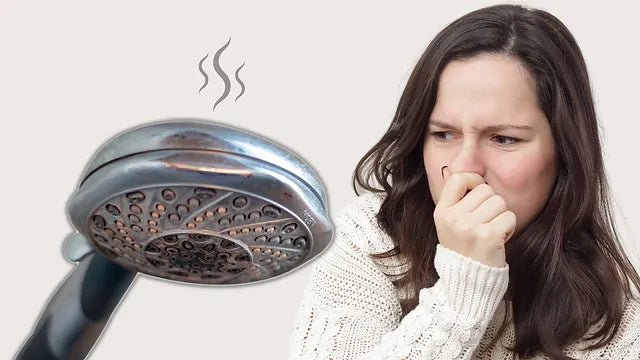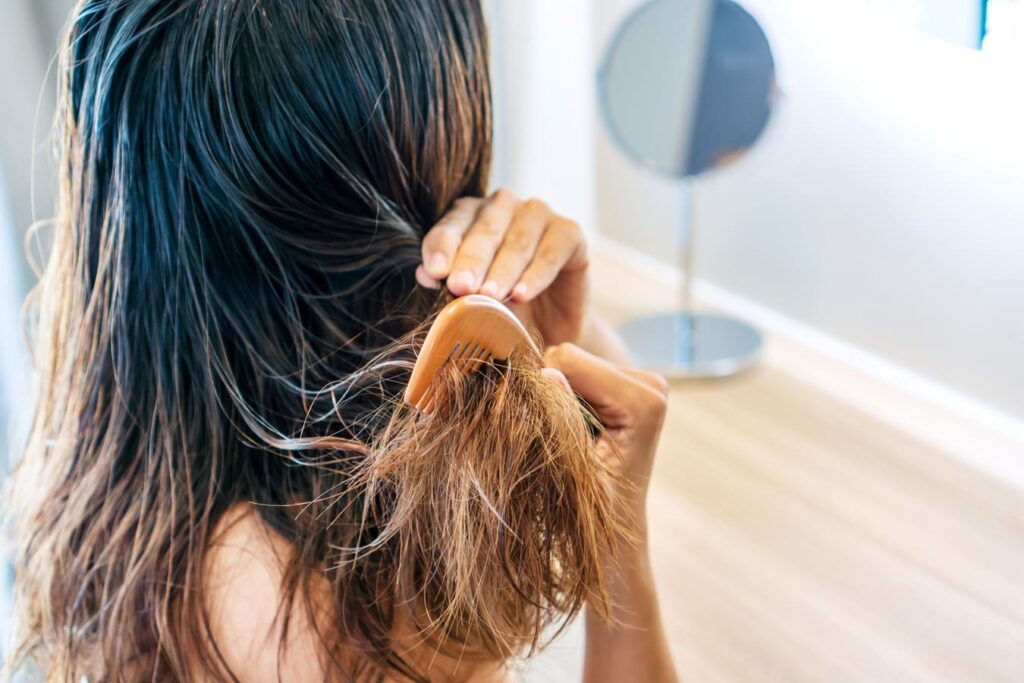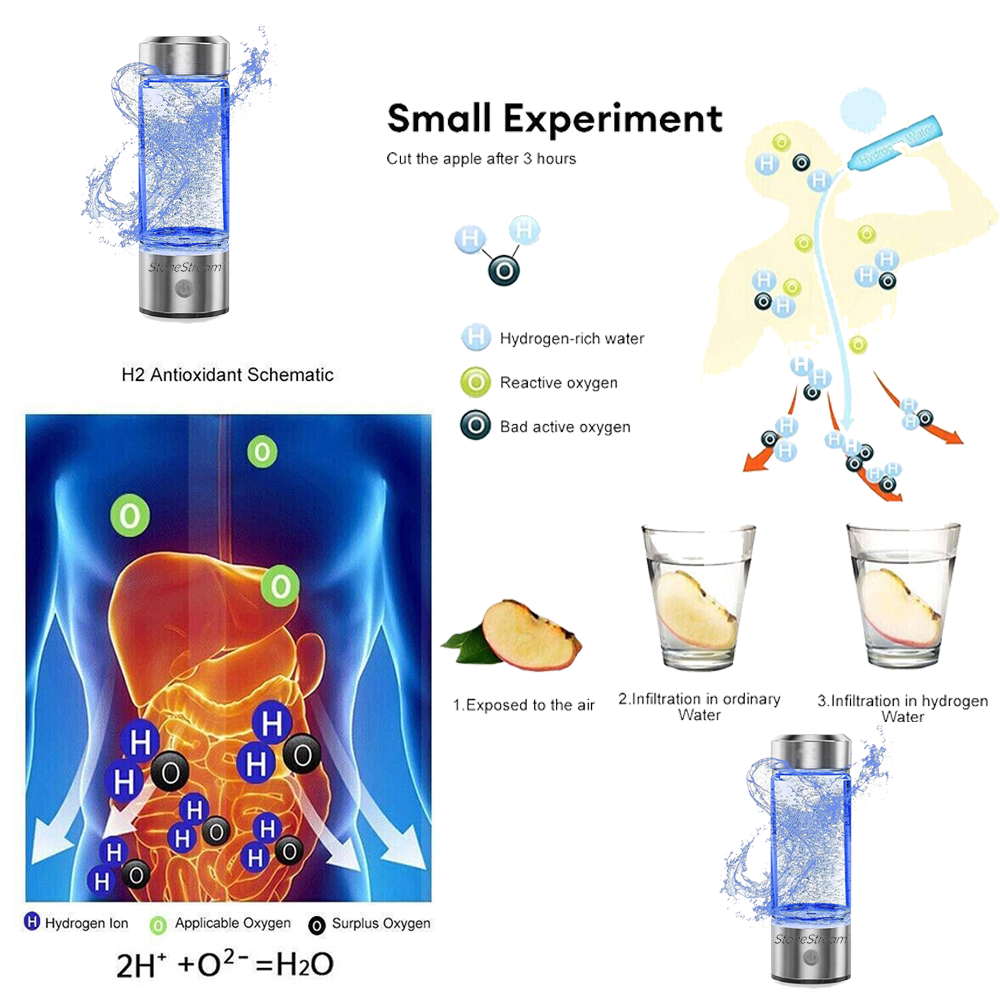Your shower room is ideally supposed to be a clean and hygienic space. However, it's not too uncommon for people to walk into their shower and think "why does my bathroom have a musty smell?"
If your shower head smells like mildew, there are a few things you can do to clean it and get rid of that pesky musty smell. After all, it's important to have a clean shower head in order to actually get clean after showering!
Why Does My Shower Head Stink?

Before focusing on the cleaning tips, it's essential to know what's causing your shower head to smell musty in the first place. There are a few explanations:
- The shower head is old, breaking down, and needs to be replaced
- There is a build-up of soap scum, mildew, algae, dirt, and grime on the shower head, which is causing it to stink
Assuming your shower head isn't too old and you'd rather not replace it just yet, the most likely explanation is that there is a build-up of dirt, bacteria, mould, soap scum, and grime on the shower head. When water droplets hit the shower head after you turn on the shower, they create an ideal environment for mildew and mould to grow. Heat and moisture are, unfortunately, fantastic breeding grounds for bacteria and mould. Over time, this can cause your shower head to start smelling musty.
In other words, your shower head smells musty mainly because of biofilm (a combination of algae, mould, dirt, and bacteria, particularly mycobacterium). You might have observed that your shower head smells like mildew particularly whenever you turn the water on — this is because mould spores get released when they come in contact with water. You might also notice that the surface of your shower head is slimy to the touch (gross, we know!). A mouldy shower head can cause a number of issues apart from bad smells, such as skin rashes and hair fall.
If you live in a hard water area, chances are that your shower head will get clogged, smelly, and slimy more quickly. This is because hard water leads to limescale buildups on the surface of and within the shower head, which encourages the growth of biofilm. This is why experts recommend getting a water softener shower head. However, for the time being, let's take a look at how to make your shower head stop smelling.
How to Clean Your Shower Head

Cleaning your shower head is not hard — you just need some distilled white vinegar!
If you have a fixed or wall-mounted shower head and are wondering how to clean it without removing it, simply fill a plastic bag with vinegar and tie it around the shower head so the entire head is submerged. Leave it on for an hour or so, and then turn the shower head on to get rinse out the vinegar and biofilm from within. You can also use a toothbrush dipped in baking soda paste to scrub the surface of the shower head clean.
If you have a handheld shower head, remove the shower head and soak it in a bowl filled with vinegar. Let the shower head soak for at least 30 minutes, then scrub it with an old toothbrush to remove any remaining biofilm. Finally, rinse the shower head thoroughly with water and reattach it. You can use these same steps if you are able to remove the fixed shower head for cleaning.
How to Prevent Your Shower Head from Smelling Musty

Prevention is better than cure, right? It's best to clean your shower head even before it becomes slimy, starts to look mouldy, or develops any kind of smell. Here are a few shower head cleaning tips that you should be aware of:
- Use distilled white vinegar: Every two weeks, fill a small bowl with distilled white vinegar and let the shower head soak in it for 30 minutes. This will help to prevent biofilm from building up and causing musty smells.
- Use lemon juice: You can also soak a shower head in lemon juice to clean it and prevent mildew build-up. Simply fill a bowl with lemon juice (or white vinegar) and let the shower head soak for 30 minutes before rinsing it off.
- Use baking soda: Baking soda is a great natural cleaning agent. Make a paste with water and baking soda, and use it to scrub the shower head clean. Rinse it off afterward.
- Use chlorine bleach: Chlorine bleach can also be used to clean shower heads and prevent mildew build-up. Fill a bowl with bleach and water (1:1 ratio), and let the shower head soak for 30 minutes. Rinse it off afterward.
- Dry the shower head after each use: Make sure to dry the surface of the shower head after each use — you can use a towel or microfiber cloth. This will help to prevent mildew and mould growth.
- Descale your shower head regularly: If you live in a hard water area, it's important to descale your shower head regularly. This will help to prevent limescale build-up, which can encourage the growth of biofilm. You can use a store-bought shower head descaling solution, or you can make your own with white vinegar and water.
By following these tips, you can keep your shower head clean and free of musty smells!
Why Does My Bathroom Still Have a Musty Smell?
If you have cleaned your shower head but your bathroom still smells musty, then the problem may be with your shower drain. A clogged shower drain can lead to some very funky smells — after all, there are all kinds of things down there, from soap scum and hair to bacteria and algae. Here's how you can unblock a shower drain.

You can also pour a cup of baking soda down the shower drain to help absorb bad smells. If the musty smell persists, then you may need to call a plumber to check for leaks or other problems.
Another reason why your bathroom might be smelling musty could be because your glass shower doors haven't been cleaned properly and have developed mould (they do get sprayed with water every day!).
So, mix equal parts white vinegar and water in a spray bottle and spritz the solution onto the shower doors. Focus particularly on the areas that have mould or spots. Let it sit for a few minutes, then scrub the doors with a sponge or microfiber cloth. Rinse it off afterward and use a squeegee to get rid of the remaining water and add some shine. Finally, use a soft and dry microfiber cloth to remove any water spots. Here's a detailed article explaining the different ways you can clean your glass shower doors and enclosure.
Hopefully, by following these tips, you will be able to get rid of the musty smell in your shower head!
ShowerScreen Cleaner Squeegee-Matte Black

Buy Now
StoneStream EcoPower Shower Heads Resist Limescale, Filter Bacteria, and Are Easy to Clean

If you're looking for a shower head that is easy to clean and won't develop musty smells, then we recommend the StoneStream EcoPower shower head. This shower head has a unique design that resists limescale build-up, and it also filters out bacteria, dirt, and chlorine from your shower water. Plus, it softens hard water, preventing mineral deposits and bad smells (a.k.a. the rotten eggs smells that hard water is known for!). This goes a long way in preventing biofilm and mould and keeping your bathroom odour-free and clean.
Our EcoPower shower heads are also easy to clean thanks to their touch-clean spray holes — you simply have to wipe them with a cloth. Every few weeks, you can use vinegar and a toothbrush to clean the shower head more thoroughly. StoneStream also manufactures shower accessories like squeegees and non-slip shower mats that make your bathroom a safe and hygienic space!



